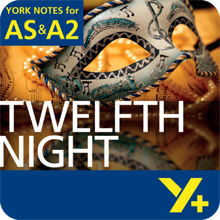Your Assessment
Read through the answer below and decide what grade to give it. Use the Hints & Tips to help you make your assessment.
It is really clear from the play's ending that true love has come out on top with the coming marriages of Viola and Orsino, and Sebastian and Olivia. The self-loving Malvolio disappears from the stage and the audience is left with the happy picture of the two couples, 'dear souls', as Orsino refers to them (V.1).
But I think that for much of the play the battle between the two ideas has been in the balance. 'Self-love' could be seen to be the more dominant of the two from the moment Orsino exaggerates his feelings for Olivia by demanding 'excess' of music to feed his emotions in Act I Scene 1. His words are sickly-sweet and do not ring true, even his pun when asked if he will go hunting 'the hart', and replies that, metaphorically, he already does – Olivia's – is rather pathetic and feels forced. For someone to spend so much time talking about love, rather than doing something about it suggests it is false. It reminds us of Romeo's words about Rosalind in “Romeo and Juliet” and implies that Shakespeare wishes to mock such self-deception. Orsino's final words of the first scene, 'Love-thoughts lie rich when canopied with bowers', make us think he is more in love with the idea of love, and what it makes you do, than actually 'in love' with Olivia. It is significant that the first line of the next scene is spoken by Viola and is direct and to the point, 'What country, friends, is this?', and is concerned with action and not just thinking.
Orsino's self-love can be seen even in his scenes with Viola/Cesario. You would think that once he was with her, even though he thinks she is a boy, his 'true love' would make him behave more truthfully. In fact he is even more boastful in Act II Scene 4. It is true that he admits men's feelings are 'more giddy and unfirm, / More longing, wavering, sooner lost and worn, / Than women's are' (II.4.31–3), but this does not lead him to realise how 'giddy' his love for Olivia is. In fact, he argues with Viola that women cannot feel passions as strongly as he does. 'Make no compare / Between that love a woman can bear me, / And that I owe Olivia' (II.4.97–100). The contrast between this, and Viola's simple, unspoken love for him and her painful feelings for her seemingly-dead brother are very striking.
Whether her speech about 'Patience on a monument' at the end of this scene gets through to him is something that is left open by Shakespeare. One possible meaning to his final lines, sending Viola off to take the jewel to Olivia, is that he remains just as absorbed by his 'false' love for her, but another could argue that in saying so little in response to the speech, he is indicating his changed feelings. You could say that silence is worth a million words.
When Orsino finally does get to see Olivia, his exaggerated praise has been reduced to a kind of throwaway comment 'Here comes the countess; now heaven walks on earth' (V.1.86).
It is as if he has forgotten how to do all the flowery emotional stuff of earlier on in the play. Perhaps for once he is thinking less of himself and actually about someone else – Viola/Cesario. As has been pointed out by some critics, Orsino the hunter has become, without knowing it, the hunted. Having referred to himself as 'one self-same king' (I.1) who will rule Olivia's heart, by the end he talks like a Renaissance poet about Viola as his 'Fancy's Queen' suggesting she rules him. This reversal of fortune represents the way self-love is conquered by true love.
In Malvolio, however, self-love dominates from start to finish ...
